Began to develop panic attacks linked to flying
Mr Guest had worked for FlyBe for a number of years and was a capable pilot with a good flying record, successfully applying for promotion which allowed him to fly over longer distances.
Mr Guest, however, began to develop panic attacks linked to flying.
He became anxious and experienced feelings of “impending doom”.
He was signed off sick on two separate occasions and received CBT therapy, counselling and medication to help control his symptoms.
After medical advice, he returned to work on a phased basis.
However, after he was scheduled to fly a four-hour journey, he phoned in sick.
His employer obtained medical advice and one report provided concerns that Mr Guest’s condition was now a “significant worry” and made him unfit to pilot a plane.
Another medical opinion stated that he should be able to return to work if he could fly short routes only.
A specialist aviation psychologist thought he might be able to return to flying but said there was “always a possibility” he could deteriorate further.
Senior executives at FlyBe met and determined that Mr Guest was unable to fly again on safety grounds.
Mr Guest was unaware of this decision and continued to receive medical treatment.
Further medical reports were obtained which suggested that Mr Guest might be able to resume flying subject to passing medical flight tests.
Having made their decision, FlyBe invited Mr Guest to a disciplinary meeting chaired by a manager who ultimately sought advice from the COO (and others) before reaching his decision to terminate.
The COO made it clear that Mr Guest should be dismissed on safety grounds if there was no alternative work he could do as the airline was not in the business of “taking risks”.
The manager advised Mr Guest of “his” decision and Mr Guest appealed.
The appeal was heard by someone who had already been involved in some of the earlier decision making around Mr Guest’s fitness to fly and, ultimately, failed.
Worryingly for all us fearful flyers out there, the Tribunal said that FlyBe had a potentially fair reason to dismiss Mr Guest (capability) but had not followed a fair procedure, making the dismissal unfair.
It ordered FlyBe to reinstate him and to pay him compensation.
The reason the dismissal was unfair was because the decision maker was not the chair of the disciplinary hearing, the decision maker did not see the medical evidence or give Mr Guest opportunity to discuss matters with him.
On appeal, the appeal manager was not independent as they had already been involved in the process to date.
It’s a shocking reminder that despite the clear safety reasons for the dismissal, you must follow a fair procedure.
Stay in the know
We’ll keep you up to date with all the latest in employment law and HR. You can unsubscribe at any time.


Recent Comments